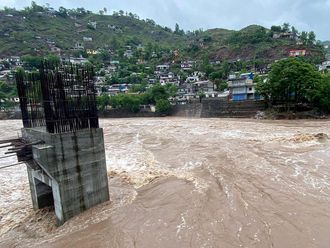Islamabad: In an alarming study, water experts have warned that Pakistan could soon face a severe drought and the country will approach “absolute scarcity” levels of water by 2025.
The grim forecast was made by the Pakistan Council of Research in Water Resources (PCRWR) in its new report released late on Monday.
“This report gives us an overview of the future but I fear we could face severe water crisis as early as next year,” Pakistan’s leading water expert, Irshad Rao, told Gulf News.
Pakistan’s largest province of Balochistan is already facing a severe drought and man-made famine due to scarce rainfall and dropping groundwater levels. The provincial capital, Quetta, is facing an upsetting situation as the water level is decreasing by three-and-a-half feet every year.
The Pakistan Meteorological Department has been warning about the coming drought for years, he said. “What Pakistan needs to do immediately is save as much surplus water, to be utilised in case of droughts” suggests Rao. “Few dams have been built by government in last decades, which is why a large amount of water goes to waste.”
Pakistan has the world’s fourth-highest rate of water usage and experts believe that poor management is a bigger issue than depleting water reserves.
Pakistan wastes water worth Rs25 billion every year, according to the Water and Power Development Authority (Wapda) Chairman retired Lt Gen Muzamil Hussain. The country receives 145 million acre feet of water every year, however, it conserves only 14m acre feet of water.
Experts say that poor water management is the main factor behind the crisis. Water policy in Pakistan is simply non-existent, says Shamsul Mulk, the country’s top water expert. Policymakers act like “absentee landlords” and “water has become the property of the landlords and the poor are deprived of their share.”
Scarce drinking water is a major issue in Pakistan as per capita water availability has fallen from approximately 5,000 cubic meters to some 1,000 cubic meters per year, which means the country is water-scarce.
A recent study by the PCRWR also found that about 69 per cent of water suppliers do not meet the National Standards for Drinking Water Quality, putting millions of lives at risk. Recently, Pakistan’s Senate was informed that only 72 per cent of the water supply schemes were found to be functional across the country, and 84 per cent of those had supplied water that was not fit for consumption.
Most households in Pakistan depend on groundwater but the quality and quantity of groundwater has depleted over the years. According to the latest study, more than 50 million people in Pakistan are also at risk of arsenic poisoning from contaminated groundwater.
Pakistan is dependent on water from a single source — the Indus River basin in India — and changing climatic conditions has led to decline in rainfall, making Pakistan a water-stressed country.
Ahmed Awais Khaver, a water expert at the Islamabad-based Sustainable Development Policy Institute, says: “We need to ensure effective pricing of water, involvement of communities, and utilisation of latest technologies.”. Innovative technologies such as direct seeding drip irrigation, micro irrigation, low-energy precision application sprinklers, recycling and treatment of wastewater can increase efficiency of water, he says.
Experts believe dams appear to be the only solution to the growing threat of water shortage.
Dr Ghulam Rasul, the director general of Pakistan Meteorological Department (PMD), has time and again recommended that Pakistan should immediately come up with a water policy, build water storage and develop a mechanism to regulate and protect groundwater.
Energy expert Irfan Choudhry also urges the authorities to take immediate action. “Pakistan hasn’t built new dams since the 1960s. What we see is political bickering over the issue. The authorities need to act now. We can store water for only 30 days, and it is worrisome,” Choudhry told local media.











